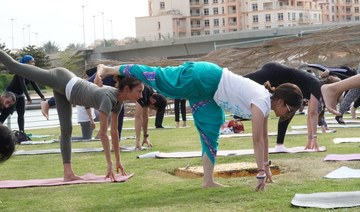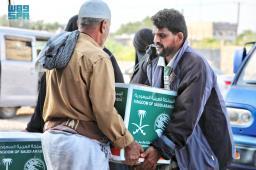RIYADH: There is a growing interest in the development of yoga in Saudi Arabia, according to the president of the Kingdom’s Yoga Committee, Nouf Al-Marwaai.
Saudi Arabia’s first certified yoga instructor and the first Arab recipient of the Padma Shri award, Al-Marwaai shared her experiences with the “Mayman Show,” discussing her work introducing, promoting, and redefining yoga in the Kingdom.
She told the show: “We regulated the practices, we designed the standards, and we even signed an MoU (memorandum of understanding) with the Ayush Ministry — which is actually the Ministry of Yoga in India.”
All the hard work paid off. Last June, the Saudi national yoga team won five medals in their first international competition at the second Mt. Everest International Yoga Championship in Nepal. The team participated in the yogasana contest, which focuses specifically on the precise execution of the various yoga positions. Samaher Al-Malki claimed the gold medal, Ahmed Shilati, Sarah Al-Amoudi and Bader Al-Ghamdi won silvers, and Joud Abed took bronze.
Al-Marwaai expressed her gratitude to the technical team and trainers, including Vijay Yadav and Paula Debral, as well as to the Kingdom’s leadership for the success. “It was, I wouldn’t say a surprise for us, but yeah, it was a very emotional moment for all of us to see the success,” she said.
The celebration of International Yoga Day on June 21 was also a huge success in Saudi Arabia. The festivities aimed to introduce people to the sport and were held in nine regions across 23 locations, attracting over 10,000 participants. The activities included practice sessions, meditations, and the honoring of the Kingdom’s yoga champions.
The Saudi Yoga Committee, established May 16, 2021, is now working to bring the sport to the Kingdom’s universities. Al-Marwaai explained that it is very important, especially for young people, to view yoga as a competitive activity, which is why it is collaborating with universities interested in incorporating yoga into the curriculum.
This way, it is hoped, more potential athletes might be identified and developed to contribute to the national team. The Saudi Yoga Committee also provides all the support for other universities that are more interested in the sport for the health and well-being benefits it brings.
Al-Marwaai used her personal experiences to set out the positive impact yoga can have on people’s health. “Yoga really saved my life — I was unable to sleep or move or even sit on the floor cross legged because of my joint stiffness,” she said. “But, after practicing yoga, I wouldn’t say I 100 percent improved immediately, but it was a gradual, significant change.”
As a child, Al-Marwaai suffered from a rheumatic disease called lupus erythematosus. The condition caused panic attacks, sleeping disorders, anxiety, stiffness, and affected her studies. Her journey towards greater health began after reading her father’s book on yoga — he, too, is a former champion in the sport.
“You can buy anything, you can replace anything, but not your health, and your mental health is something you don’t see or feel until it’s really compromised,” she said.
“Mental health is very important for you. Growing up, life has challenges, so taking care of your physical health, and mental health as well, it’s going to actually decide what quality of life you’re going to have when you grow old.”
Yoga can also be used to promote international peace and development. With its growing popularity in the Kingdom, Al-Marwaai gave the example of how yoga serves as a strong cultural bridge between Saudi Arabia and India. “It’s Indian culture, and by promoting that, we’re actually promoting the friendship and the cultural exchange with India,” she said.
The Indian G20 Summit this September echoes a similar message through its theme, “Vasudhaiva Kutumbakam,” which means “One Earth, One Family, One Future.” This expression, originating from an old Indian text, aligns with many principles found in yoga and its teachings, Al-Marwaai said.
To live up to her title as the first accredited yoga acharya, Al-Marwaai gave a brief demonstration of the pranayama breathing technique.
“Once you’re trained, once you start seeing the benefits, you will never stop practicing that,” she concluded.

































